
by Janice L. Newman
Star Trek has given us some great episodes this season. Sadly, Let That Be Your Last Battlefield was not one of them. It was ineptly written, poorly directed, and both ham- and heavy-handed in its delivery.
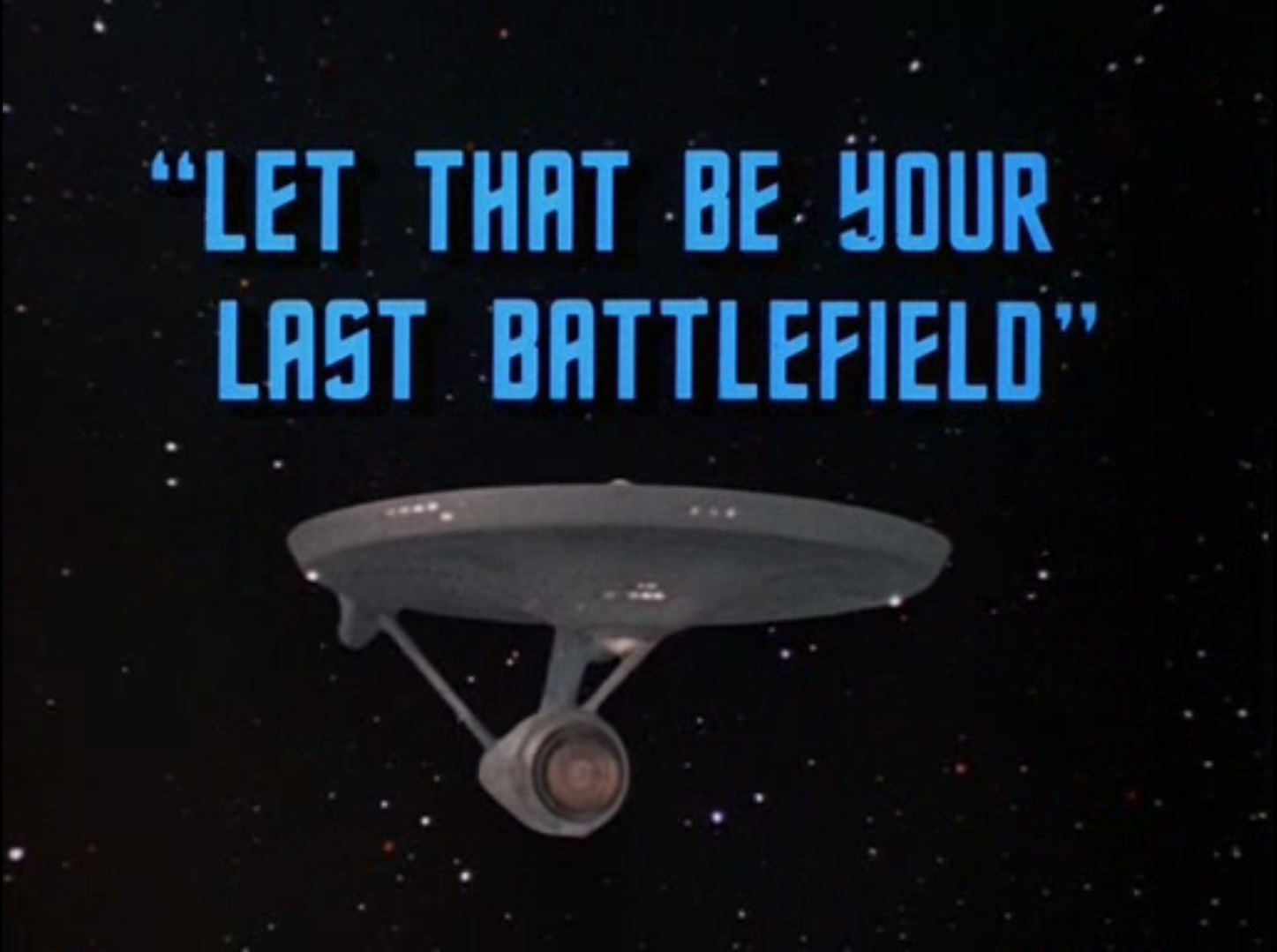
The story opens with the Enterprise coming across a stolen shuttlecraft on the way to Ariannus, a planet which urgently needs ‘decontamination’ else millions will die. The shuttlecraft is in distress, and the crew bring the vehicle aboard and treat its lone passenger. The scene with the shuttle bay opening and closing is a good effect…but would have been even more so if they had edited out the “1701” across its side.
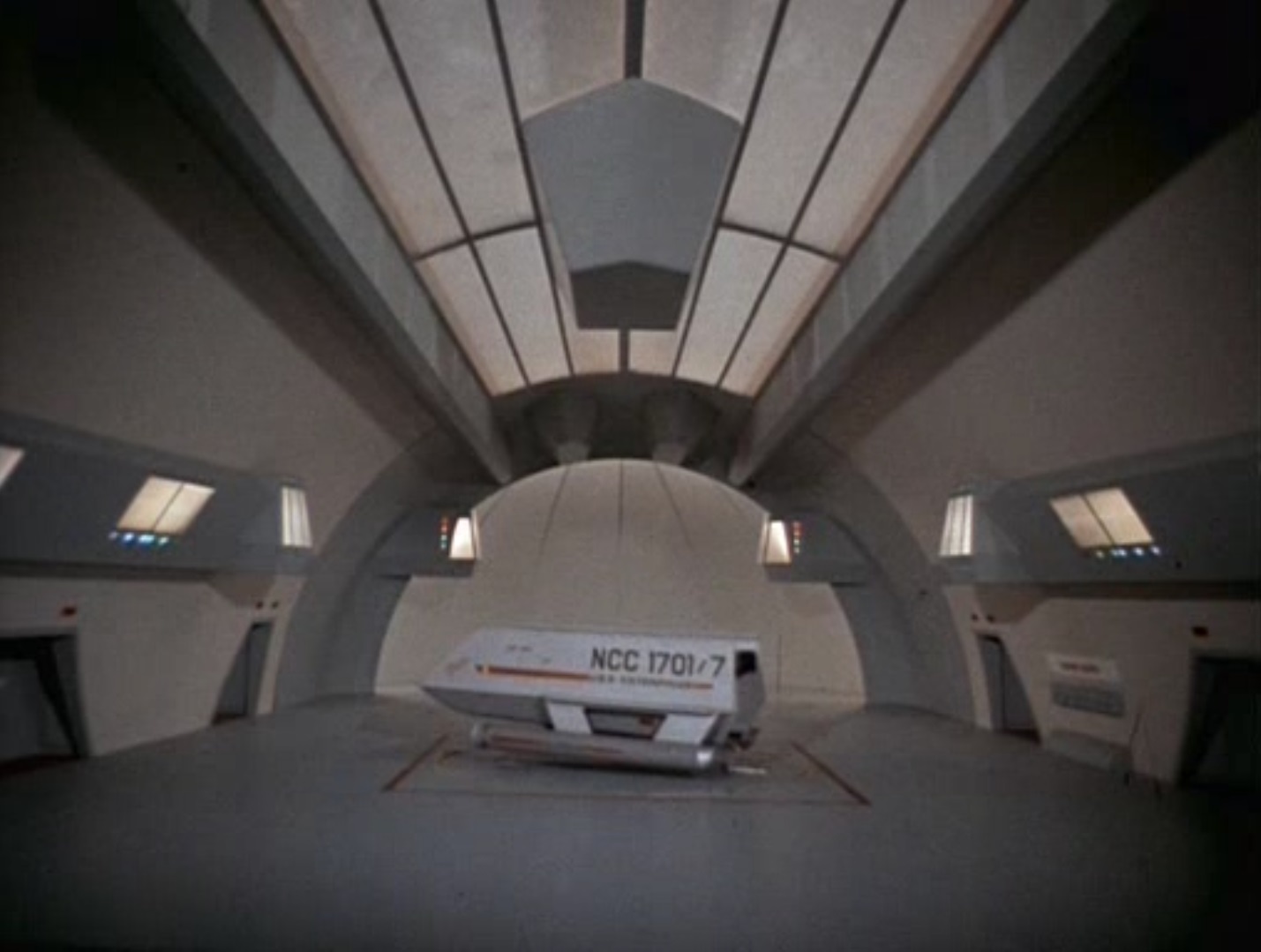
The latest rage: All Federation shuttlecraft have the Enterprise's serial number
The scriptwriter here makes the first of a number of blunders. Over-eager to ‘explain’ the strange black-white coloration of the alien, the author penned an awkward conversation between Doctor McCoy, Captain Kirk, and Mr. Spock about how such a being might have come to exist. The problem is that this explanation is unnecessary and feels forced. The audience has seen plenty of strange aliens thus far and almost never has there been a need to ‘explain’ how they came about. Furthermore, the explanation doesn’t explain anything. Spock and McCoy write off the divided coloration as being a totally unique mutation, while Kirk nonsensically opines that “…he is the result of a very dramatic conflict.”
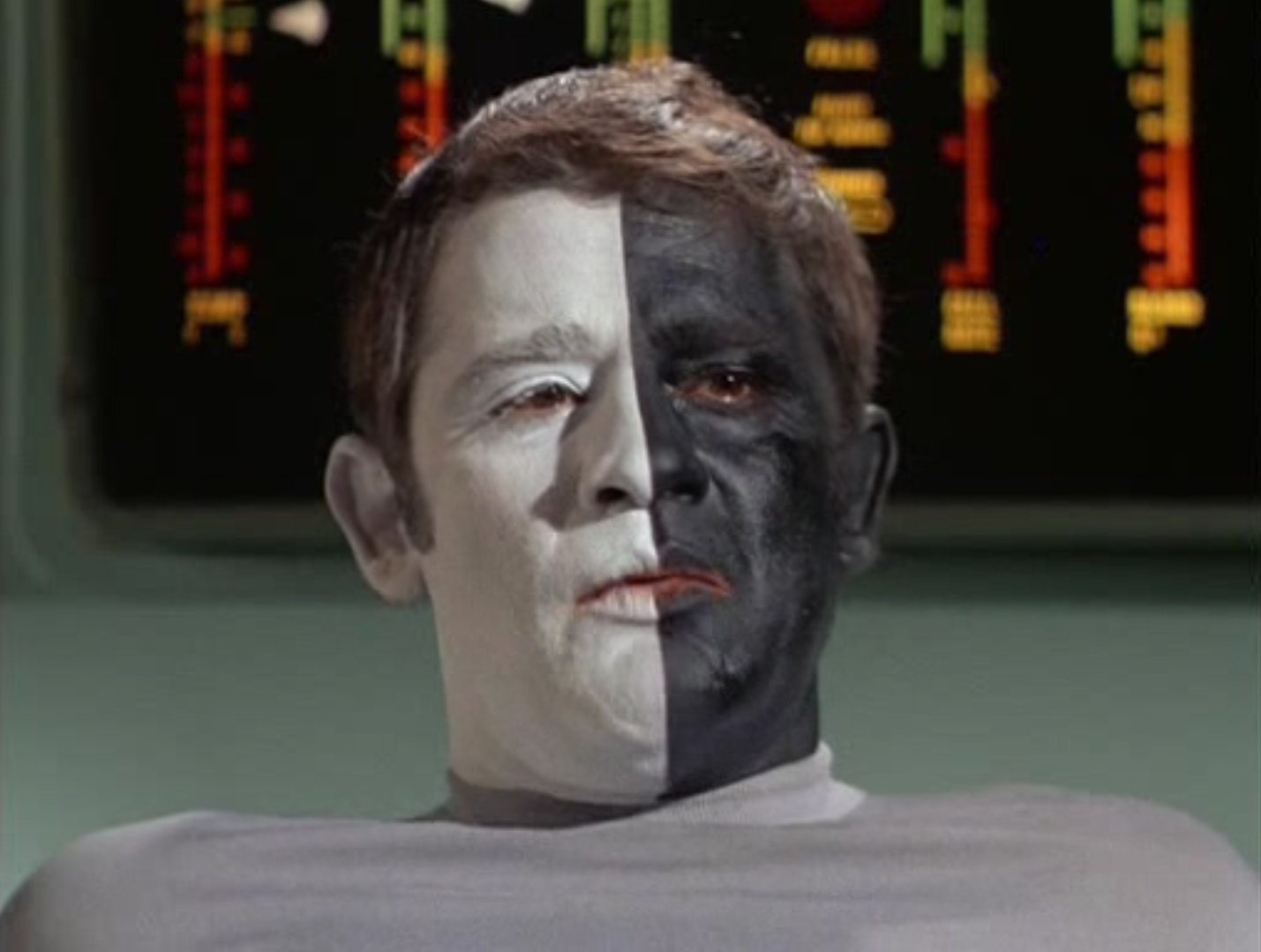
They got blue people and green people but this guy looks weird? And no one suspects it's not a cosmetic affectation?
The alien’s name is Lokai. He takes umbrage at the assertion that he ‘stole’ the shuttlecraft, both implying that he was only borrowing it and outright stating that his great need justified taking it. When Kirk attempts to interrogate him further, he becomes uncooperative and refuses to answer any more questions.
Kirk is called back to the bridge when an alien ship shows up—or doesn’t show up, as the case may be. The sensors are picking it up, but it doesn’t show up on any of the screens. It’s on a collision course with the Enterprise and ends by disintegrating against the hull and depositing one alien onto the bridge in the process.
This entire scene was awful. It’s a little tricky to put into words what made it so bad, but it had me groaning and hitting my head against a pillow repeatedly, so I will try.
First, the camera repeatedly did an extra-dramatic zoom in and out and shake effect on the red alert light. It drew laughs from the watching crowd, feeling more like something out of Voyage to the Bottom of the Sea than Star Trek. The entire sequence is contrived and unnatural, existing only to get the characters where the writer wanted them. Efforts to ‘explain’ the ship and its fate, like the prior conversation about mutation, serve only to highlight how silly it all is.
The new alien is named Bele, and in direct contradiction to the previous conversation about one-of-a-kind mutations, has the same half-black and half-white coloration as Lokai. He states that he’s “chief officer of the Commission on Political Traitors” on his planet, and has come to claim Lokai. Kirk challenges him, but agrees to let him see the other prisoner.
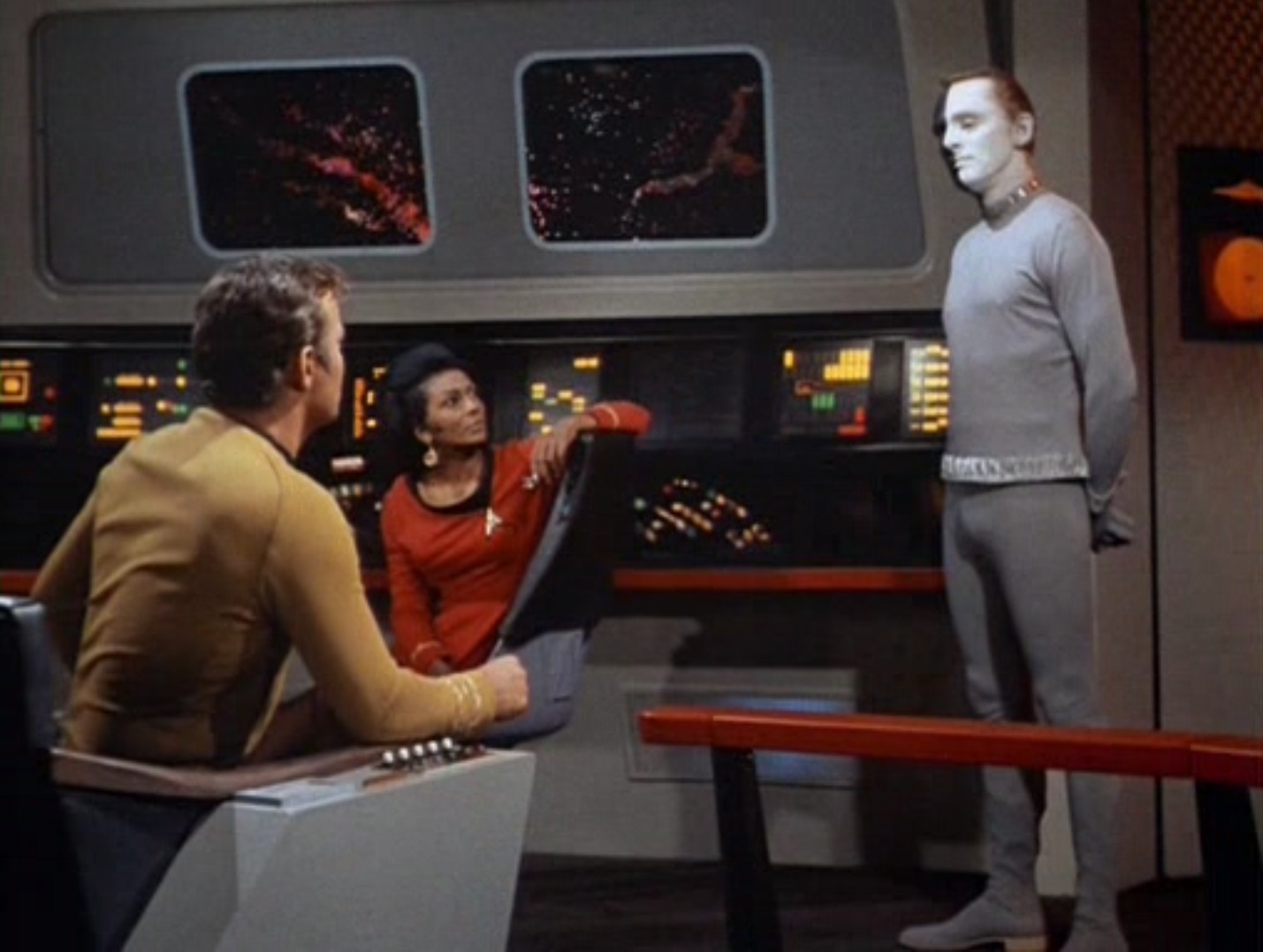
"Riddle me this, Captain: what's black and white and insufferable all over?"
Bele and Lokai proceed to react to each other with pure vitriol. Lokai claims that he is a revolutionary, fighting for the rights of his people. Bele calls him a loathsome murderer. Lokai turns to Kirk and demands political asylum, while Bele demands to be taken to their home planted, Cheron, immediately. Kirk tells them both that Starfleet will sort it out after the Enterprise finishes their decontamination mission, as millions of lives are at stake. Bele states that this is unacceptable, just before the Enterprise takes a new heading, seemingly all by itself.
Maddeningly, Kirk doesn’t connect the misbehavior of his ship with the presence of the aliens aboard until just before Bele outright claims responsibility. Lokai and Bele have another confrontation on the bridge, both of them ignoring the fact that “millions of lives” on Ariannus are at stake. Kirk orders both of them to the brig, then shot at with phasers set on stun, neither of which are effective against the aliens’ “personal shields”.
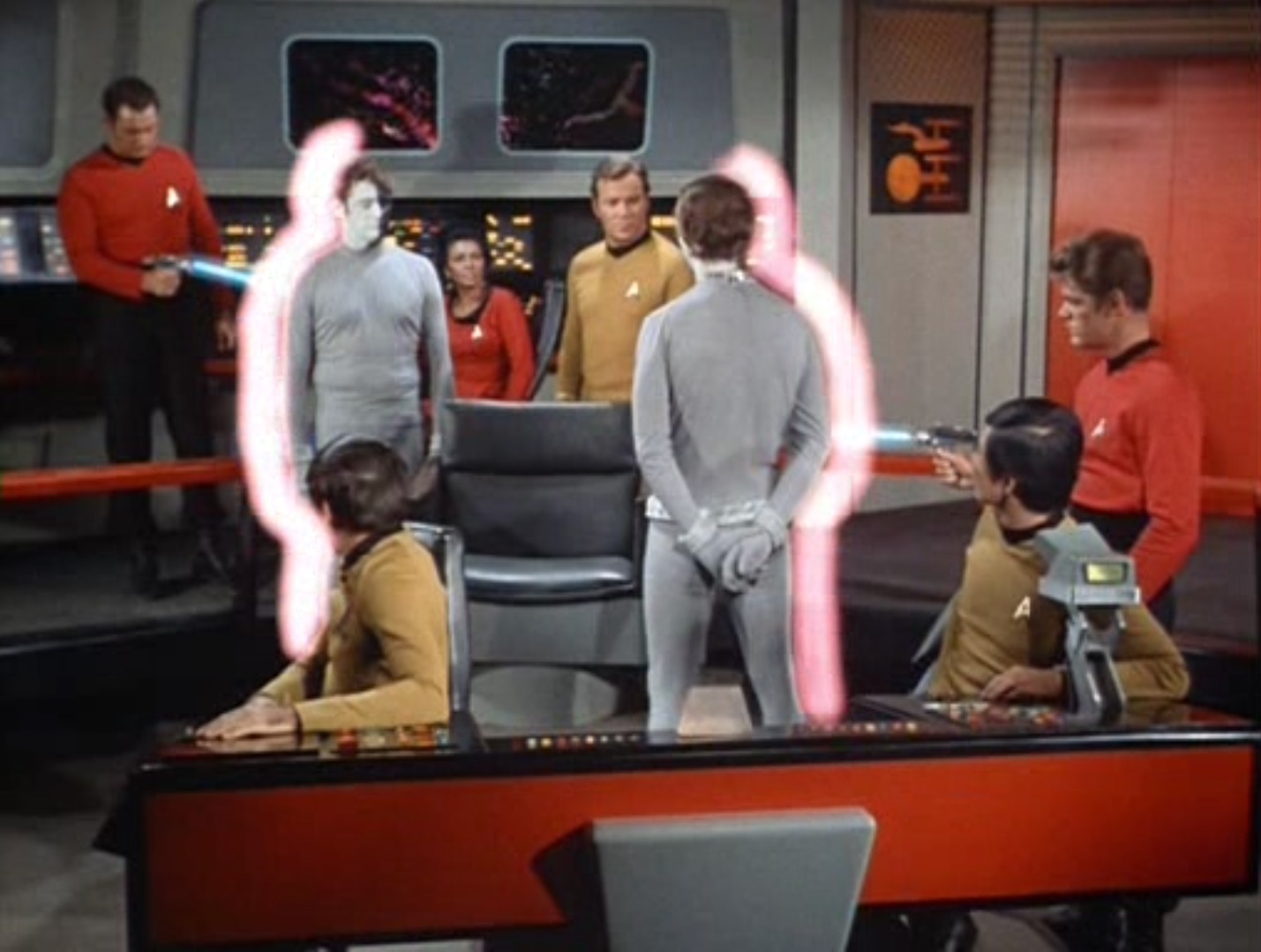
The rarely seen "tickle" setting of the phaser
Contrived, contrived, contrived. I felt the hand of the scriptwriter turning and moving the ship like a child with a toy. The scriptwriter didn’t want Bele or Lokai thrown in the brig or knocked out, so they were given invincibility. The creator of the story wanted certain things to happen, and so forced them to happen in the bluntest and most direct ways possible.
However, Kirk’s response to Bele did lead to a scene I actually liked. Kirk tells Bele that the ship will fulfill its mission to Ariannus or he will destroy it. Bele tries to call his bluff, and Kirk initiates the self-destruct sequence. This was perhaps a little drawn out, and the codes for self-destruct could have been more complex than variations of, “one, code one, one A”. Still, Kirk’s defiance and unwillingness to surrender his ship is great, very in-character, and the scene actually managed some genuine tension.
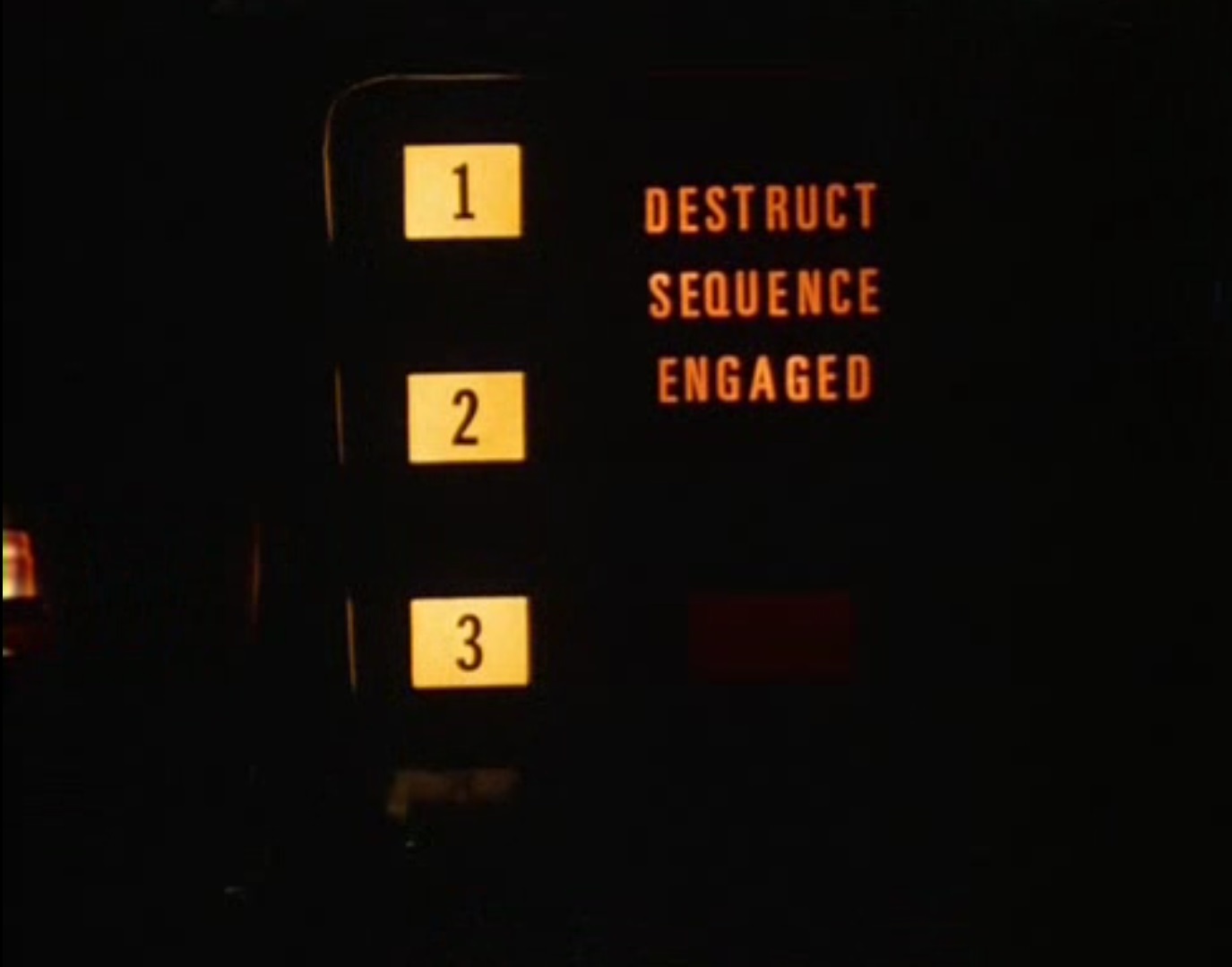
"This starship will self-destruct in five seconds…"
Kirk’s never tolerated threats to his ship well, so it’s a little jarring that he chooses to give them free run of the ship after that. On the other hand, how could he stop them? They’ve been shown to be invincible and Bele is both able and willing to take over the ship, even at the cost of “millions of lives”. Kirk has exactly one possible counter-move, and it’s one that would lead to a Pyrrhic victory indeed.
Lokai begins making friends among the crew, making his case to them. He says something interesting here that could have been great if the writer had bothered to follow up on it: “Do you know what it would be like to be dragged out of your hovel into a war on another planet? A battle that will serve your oppressor and bring death to you and your brothers?”
This tantalizing hint of actual background is once again casually ignored by the rest of the story. We cut to Bele, drinking with the Captain and trying to win him to his side much the same way that Lokai is doing with the crewmembers. It is in this conversation that we come to the crux of the episode, a point delivered with a sledgehammer. Bele is amazed that the captain and Spock can’t see his superiority. He is, after all, black on the right side, while Lokai is white on the right side.
Wow, this racial metaphor is so nuanced and clever!
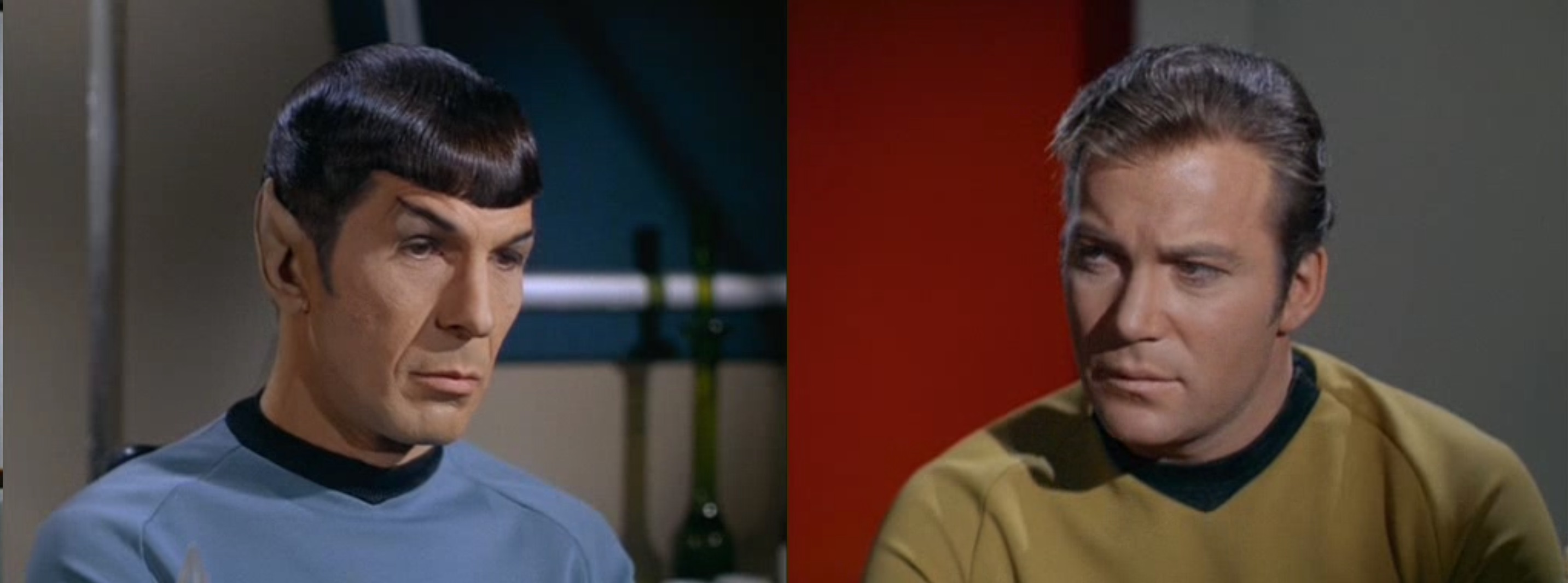
A punchline not worth waiting for
Well, perhaps in more skilled hands, it might have been. There is certainly a simplicity to the message, to the point where even a child could understand it. We the viewers are shocked by what appears to us to be such bizarre and extreme racism over a minor difference. We are meant to take it to heart, to apply it to our own lives and question our own prejudices.
The problem is, the message becomes muddled despite itself. I will leave going into detail as to why the portrayal of the two aliens undermines and even contradicts the episode’s theme to the other writers on this piece. Suffice it to say that the “revelation” of the source of the racial differences elicited more groans than gasps from the watchers in my house.
Ariannus is successfully decontaminated, and Bele takes control of the Enterprise again, this time burning out the directional and self-destruct circuits first. (In other words, the scriptwriter’s hand once again descended upon the ship and turned its course to Cheron.)
The ship arrives at Cheron and finds that the people on it have destroyed each other (presumably fairly recently, since there are still bodies on the planet). Bele chases Lokai through the corridors of the Enterprise, with Kirk doing nothing to stop them. Pursued and pursuer beam themselves down to the dead planet, presumably to try to kill each other. Kirk leaves them there, and we are spoon-fed the other Important Message of the episode:
SPOCK: To expect sense from two mentalities of such extreme viewpoints is not logical.
SULU: But their planet's dead. Does it matter now which one's right?
SPOCK: Not to Lokai and Bele. All that matters to them is their hate.
UHURA: Do you suppose that's all they ever had, sir?
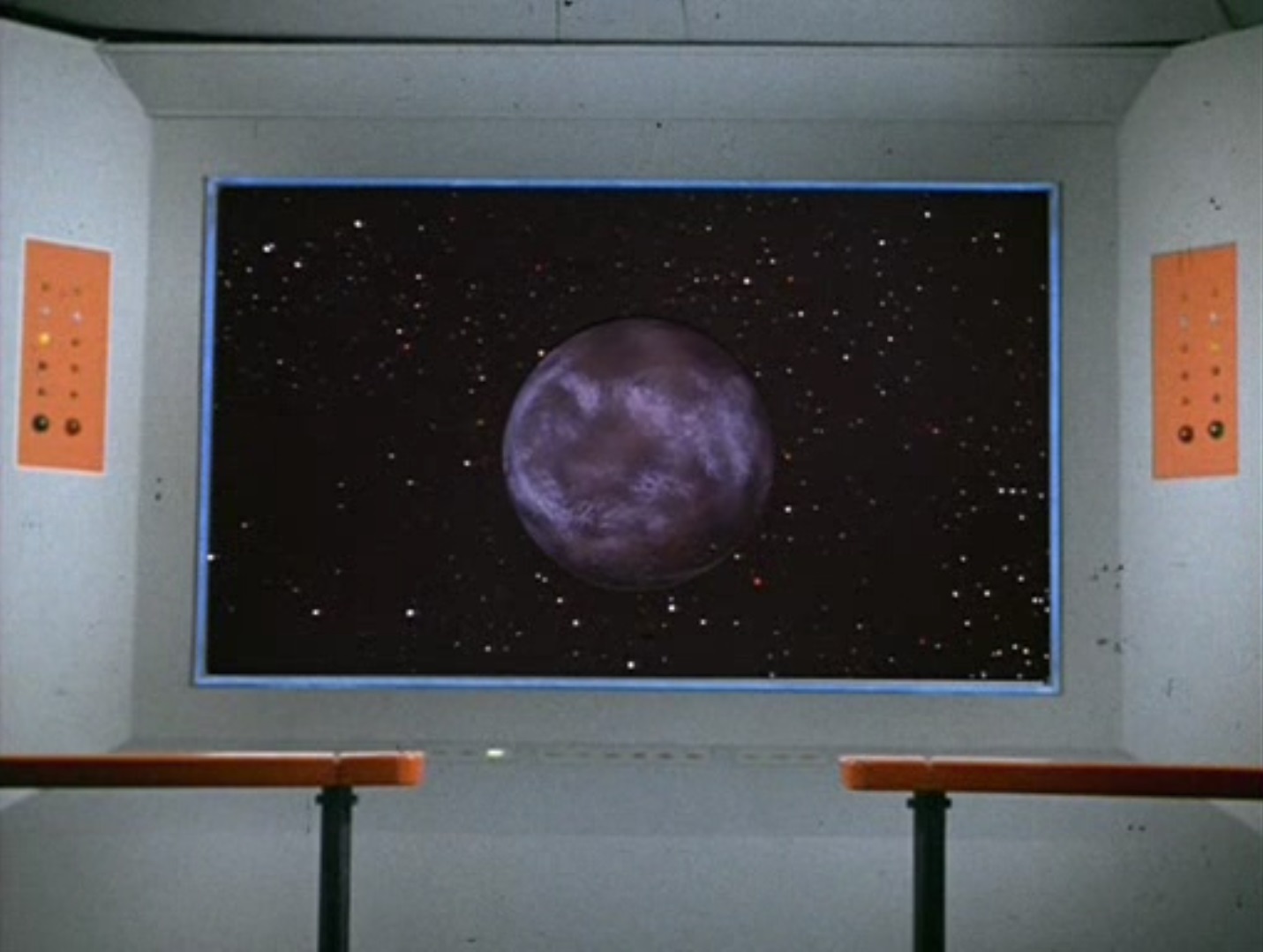
The ashes of Detroit still smolder after 50,000 years
Well. That was a mess of poor writing, inept directing, and Shatner’s own particular brand of scenery chewing. And as much as I appreciated the messages the writer so desperately wanted to convey, it would have been more effective if the plot could have settled on one of them instead of trying to cram in both. If you want to watch a good episode about the dangers of racism, irrational hatred, and unchecked violence, wait for a re-run of Day of the Dove.
One and a half stars (the half almost entirely for the self-destruct sequence.)
Bones beneath the fat

by Lorelei Marcus
At a sacrifice in Ancient Greece, Prometheus once slaughtered an ox and offered up two piles for Zeus to choose from. One contained the meat and much of the fat. The other was a pile of bones artfully arranged under a layer of glistening juices so as to look like the more appetizing pick. Zeus chose the latter, and was so angered by this deception that he withheld fire from humanity.
From the unsubtle makeup to Lokai's stirring speech against Bele in Sick Bay, "Let That Be Your Last Battlefield" presents itself as a racial narrative in favor of Black rights. Yet, somewhere along the way, it loses that thread and ultimately concludes with a different message: If we continue to hate one another, we will only destroy ourselves.
This is quite a turn which clashes spectacularly with Lokai's initial characterization. Of course, Lokai is bound to hate the group which subjugates and ghettoizes his people. His revolutionary vigor seems justified when he is fighting for "basic dignity", a trait Kirk has often associated with humanity's freedom when dealing with alien enslavers and oppressors.
However, the finale would have you believe that Lokai's hatred is unjustified, or at least, excessive. Therein lies the true sin of the episode, because to achieve the dramatic final theme, it must gut its initial framing of racial injustice and the characters that metaphorically represent it.
Lokai is consistently unlikable. He arrives as a suspected criminal, refuses to communicate or cooperate, and he is quick to anger. Regardless of how noble his initial goals, or how genuine his pleas for amnesty, he is never truly taken seriously by the Enterprise crew and therefore, we also see no reason to sympathize. Throughout the episode, he is termed a firebrand, a troublemaker, and even a murderer, with no redeeming actions to prove otherwise. He also reveals a prejudice, not just against his oppressors, but also the monocolored humans and audience, further alienating him and his cause.
Bele's character, in contrast, while evil by default, is treated with respect, making Lokai look worse still. Bele is quickly established as the oppressive, bigoted, authority. He also commits heinous acts like hijacking the Enterprise from a critical, planet-saving mission for his own selfish purposes. But isn't he justified because he has toiled for nearly 50,000 years to capture his criminal, a mass-murdering fanatic? And after all, he does eventually allow the Enterprise to finish her mission, so can he really be so bad?
Well, yes, and the ending would even like to remind us of that: even with his whole planet destroyed, Bele is doomed by his own hatred to forever chase Lokai across their barren world. But first, he is allowed to roam the ship like an esteemed guest and even dine finely with the Captain. Even certain emissaries have not had so high an honor, but I suppose there are special treatment regulations for starship hijackers.
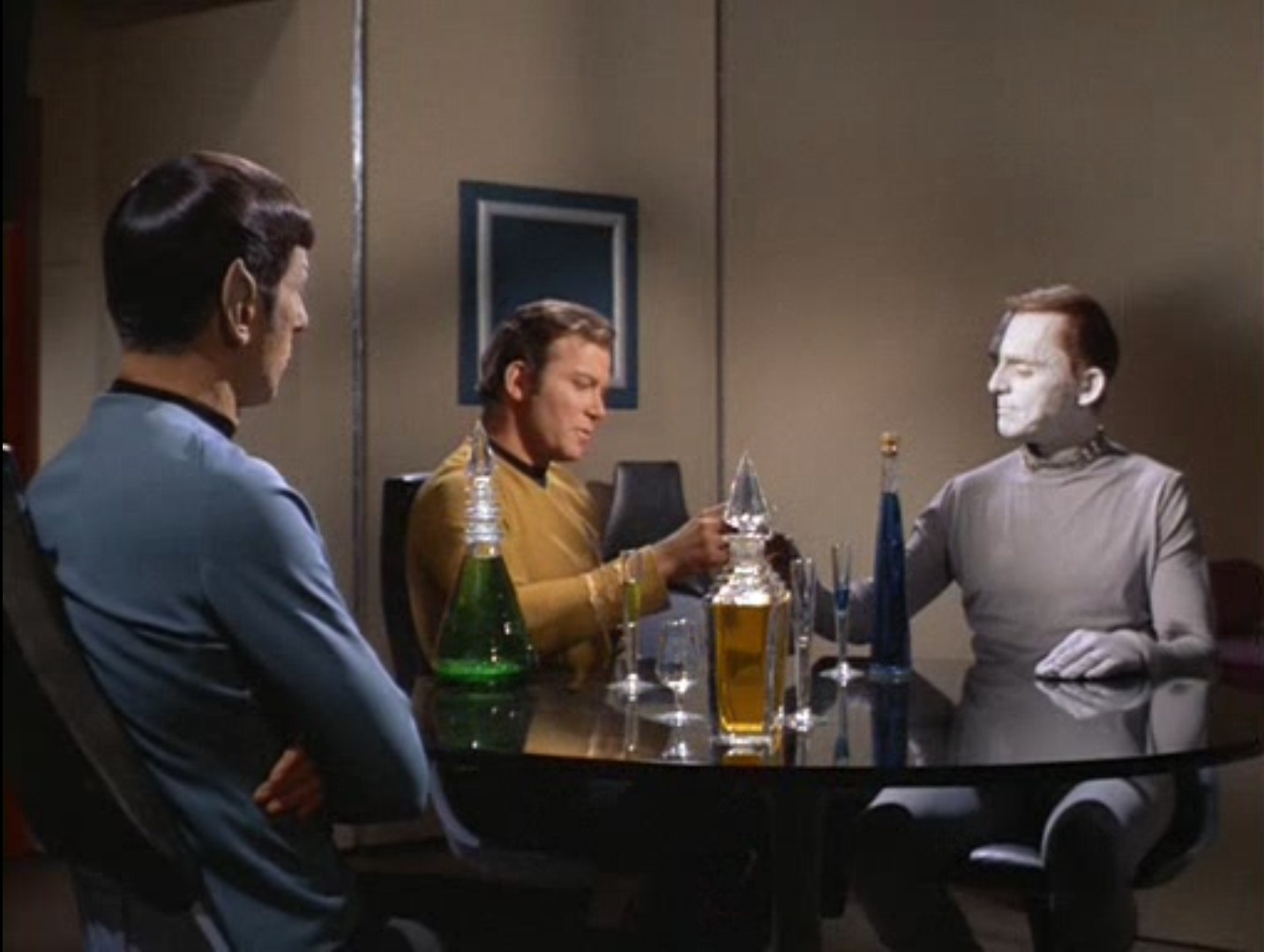
"Well, in compensation for our not immediately flying you to Havana, have some brandy."
While Bele's motives are prejudiced and unsympathetic, this kid-glove treatment affords him some respectability, furthering Lokai's appearance as irrational in comparison.
This brings me to my conclusion. Lokai and Bele both ultimately come across as incomprehensible extremists. Lokai is logical in motive, but not in action; Bele is logical in action, but not motive. Tragically, their extreme hatred seems to be a microcosm for their whole planet's struggle—they appear as figureheads of the two sides. Thus, the episode becomes a cautionary tale against extremism.
Yet, the shroud of the race-relations narrative remains, literally expressed by the ever-present alien makeup. So the two themes join, linking extremism with the race struggle and its leaders. This, in turn, undermines both causes. If Lokai's genuine issues can be disregarded with the justification that he is unlikeable and dangerous, then what implication does that have for the black man? Did the riots not begin because pacifist pleas for change fall time and time again on deaf ears?
The episode is so self-righteous about stopping hatred that it sours the positive social message it could have had, and instead, vilifies the struggle it claims to represent.
And so, some of the fire in my passion for Star Trek diminishes. To describe the episode in a word, I'll quote Mr. Scott: "Disgusting."
One star.
An end to war

by Jessica Dickinson Goodman
24 men died on the USS Enterprise yesterday, another 85 injured as a rocket exploded onboard; 11 planes were also destroyed. Those young men were on that ship in service of a war many had no right to vote for just seven short months ago. The Enterprise herself has touched many conflicts — Vietnam, Cuba, Japan, the Middle East — and was preparing for her fourth deployment to Vietnam. This is the fourth time a U.S. aircraft carrier had caught fire in 15 years, accidents that killed 537 sailors in total according to The New York Times; of the four, only one involved enemy fire.
I was thinking about the ways in which war destroys the people who wage it while watching “Let That Be Your Last Battlefield.” Rather than an atom-powered football field-sized carrier ferrying fighter jets to bomb a country that barely has an air force, the war in this episode is reduced to two men; a binary pair. Their hatred is made irrational, and while other reviewers found it ham-handed, I found it operatic.
We have the sense of scale conveyed by a few terse lines — millions in danger; 50,000 years of pursuit! We have the stentorian arias given by Kirk, Spock, and our two representative combatants — where Kirk and Spock could have been Purcell tenor roles with their clear, short, decisive words, Lokai and Bele were all Mozart at his muddiest and most secretive, all Sarastro lecturing Pamina in coded Masonic lessons about how the world works with none of the delicacy or lightness of the Queen of the Night’s aria to lift us up again afterwards. We also have the oversized tragic ending — not just these two men killing each other, as they've been trying to do all episode long, but their entire world dead, corpses left on the ground unburied, and them doomed to chase and haunt each other amongst the moldering wreckage of their hatred forever more, like the ending of a Noh Play written for Tom and Jerry.
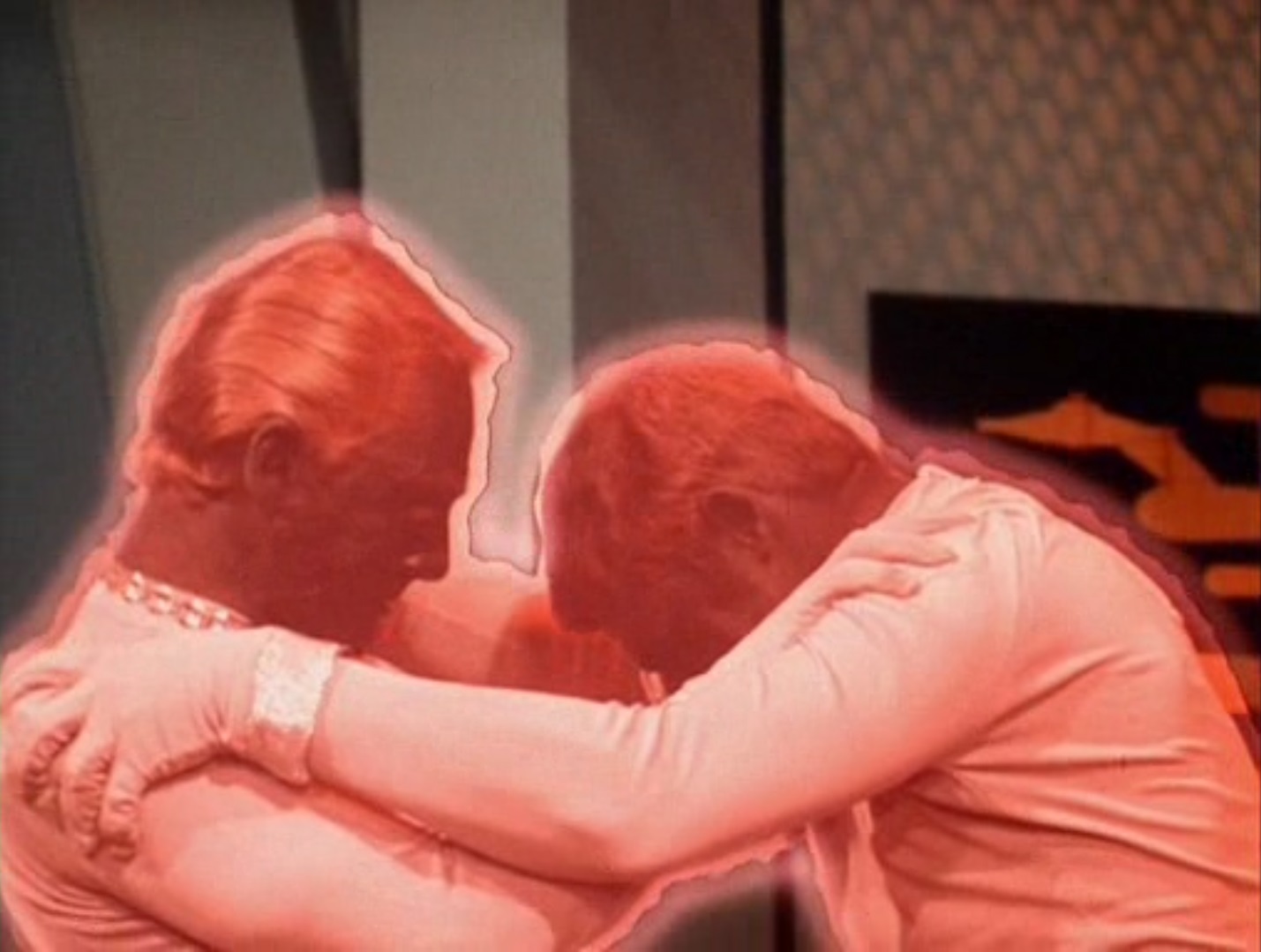
But what of Lazarus?
With the bright light of the teleporter and the offstage decision makers driving the plot, it reminded me of nothing so much as the end of Puccini’s Suor Angelica, where the former-aristocrat-and-current-nun learns her child out of wedlock has died and she kills herself. Obviously the plot is not the main parallel; Suor Angelica is mostly women’s roles, making it a favorite of mixed gender opera programs around the world, and Star Trek is sometimes pressed to include 2 speaking women per episode, much less a dozen. It is the feeling of the ending as an audience member that is the same. In my favorite productions of Suor Angelica, as she sings her final aria, begging Mother Mary to save her after she’s poisoned herself — “Madonna! Madonna! Salve me, salve me!” complete with its glorious high A's — a bright light floods down on center stage, a transporter beam from the Madonna herself, bringing Suor Angelica up with her to heaven to reunite with her child.
For me, there is something likewise satisfying about the ending of “Let That Be Your Last Battlefield.” These two men have wreaked havoc across the galaxy for centuries, trailing their hatred like plague corpses, disrupting societies, destroying lives as they whirl and swirl and clash against each other. And as of the end of the episode, they cannot. They are planet-bound, returned to the home they both thought they were fighting for, deprived of the tools to hurt anyone but themselves. Trapped, forever, in a Hell of their own making, reunited and secure in their hatred.
Real war is nothing like opera or science fiction. It is famously boring until it’s not, and mostly kills people who had no say in its arrival or its leaving. Many who die in war and no small number who fight in it fervently wish that each clash would be their “last battlefield”; after all the useless deaths of sailors the real life Enterprise and of families who are Vietnamese, Nigerian, Palestinian, Eritrean, Guatemalan, Rhodesian, Laotian, Irish, and so many more who are suffering war today. It was nice, for a little less than an hour, to see a world on my screen where no matter how bloody, some wars end.
Three stars.
You've Come a Long Way, Baby

by Mx. Blue Cathey-Thiele
Ads for Virginia Slims cigarettes have been playing over the past several episodes. Women sneaking away to smoke and getting caught, with an emphasis on how outdated the idea is. Thanks to the suffragettes we see, women won their rights in 1920. Modern women can vote and smoke! It's fashionable to applaud that movement, and from this side of history, relatively easy. None of the ads have mentioned the much more recent Voting Rights Act, though, which passed among significant backlash just a few years ago.
Part of Star Trek's appeal is that it offers a future that upholds ideals of equality. Most of the time.
The most important scene, to me, is not the final moments of pursuit against a backdrop of destruction. It is instead, a conversation held almost off-camera as Spock listens from behind a door.
LOKAI: I act the madman out of the anger and frustration he forces upon me, and thereby prove his point that I am a madman. [….] How can you understand my fear, my apprehension, my degradation, my suffering?
CHEKOV: There was persecution on Earth once. I remember reading about it in my history class.
SULU: Yes, but it happened way back in the twentieth century. There's no such primitive thinking today.
Except, prejudice is there when McCoy casually insults Spock for his biology and culture, or when crew members disregard his authority after he acts in accordance with Vulcan philosophy.
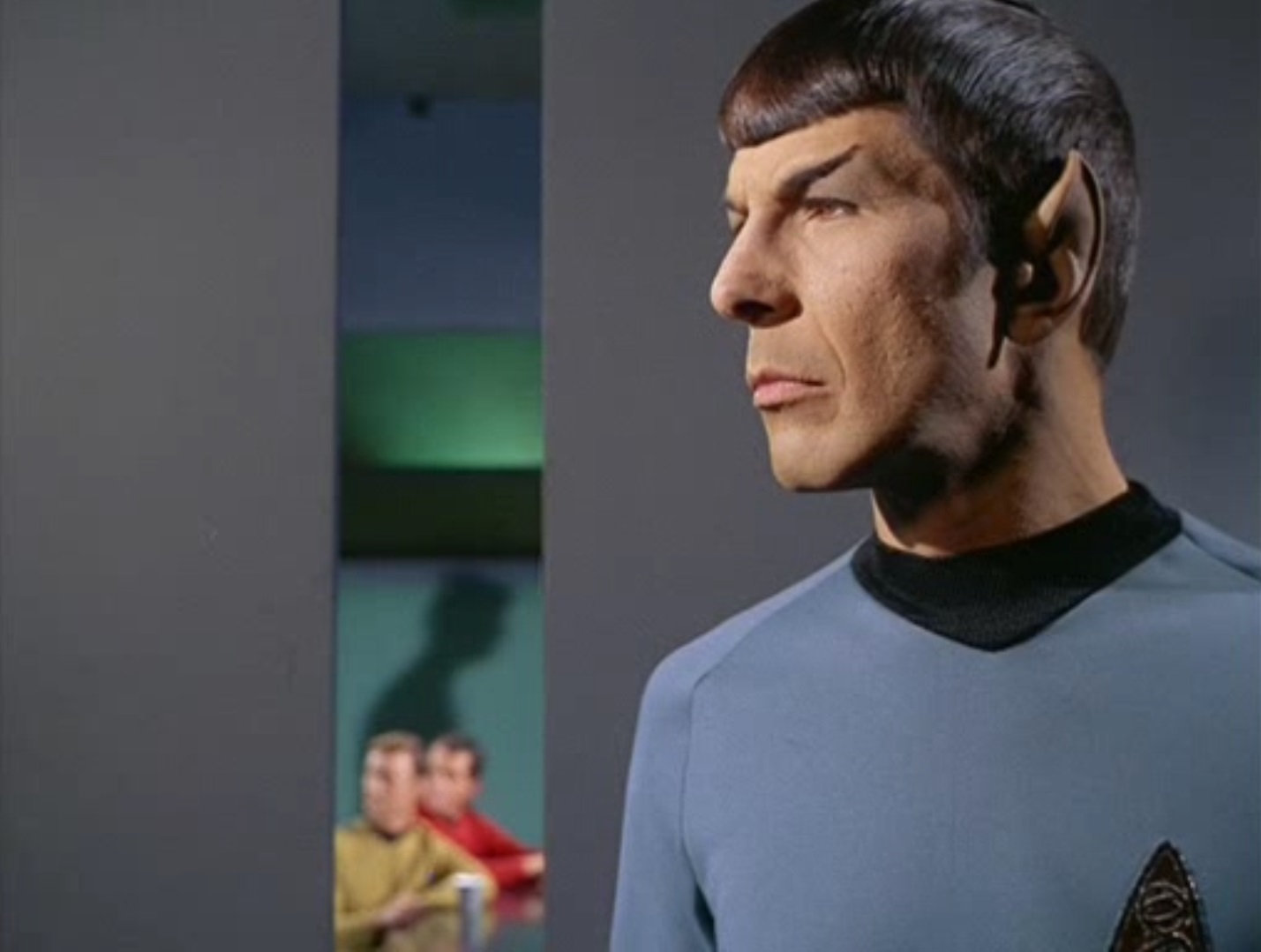
"Preach it, Lokai."
The message is tucked away from the rest of the ship and the rest of the episode. It's easy enough to make broad statements decrying hate. It is harder to face up to the part that we ourselves might play, to confront the systems that allow hate to act with authority. As fans of science fiction, many of us like to think of ourselves as more open-minded, more accepting. It's only logical. The true test is when those standards are challenged, when equality extends “too far”. Yes, yes, rights for women – but not too many. Freedom of religious expression – for some.
How many people today will support the cause of the oppressed, and yet sit and break bread with the oppressors under the guise of “civility”? Bele admitted his people's culpability in the crimes Lokai accused him of, and still was treated better than some of the diplomats the Enterprise has been charged with carrying.
Kirk tells Bele, “I cannot take sides.” He can, and by his own moral standards, he should. He may have limited power against an alien who can take control of the ship with his mind, but that has never stopped him from speaking his piece before.
Lokai is loud and angry, he insults the crew even as he asks for help and asylum. Nothing about his behavior is particularly endearing to his cause. And that, whether the rest of the episode discusses it or not, is important. The Federation, represented by the Enterprise, has standards of justice, and none of those standards are based on being well-mannered. What is right does not depend on what is easy or palatable. The meanest, rudest individual still deserves rights, because rights do not depend on being likable.
3 stars
Rich Tale to Poor Tale

by Joe Reid
“Let That Be Your Last Battlefield”, the second episode of Star Trek for the new year, drew out of me thoughts both praise and derision, with feelings of familiarity and futility. This episode at first took a simple message and elevated it with meaningful layered acting, only to become so utterly absurd, undermining said message.
The Enterprise encountered a stolen shuttle with a man in need of help. Aid was rendered by the crew to ensure that the alien man survived to answer questions. Things quickly went downhill as the half white half black alien, named Lokai, awoke in the infirmary with a suspicion on his face as was accused by Kirk of theft. Lokai objected only to being further pressed by Kirk on the matter, which led to no questions being answered by the two-tone alien as he refused to continue being interrogated. The brief exchange revealed that Lokai had a purpose for “using” the ship, which he was willing to face consequences for. Also, that he had been disappointed by “monotone humans” in the past.
This scene to me felt different than others on TV—the difference being that the character with the hidden cause in custody is often Negro or some other race. I felt a familiarity with Lokai’s circumstances. To be thought of as a criminal before trial. To be frustrated by a lack of or even willingness by some to understand my situation. Lokai served up a lot in this short scene. I found it interesting that the performance was carried out by a white actor portraying an alien who was neither black nor white. If the character were black like me, I might’ve identified with his plight and sympathized with his frustration at authority and the evasiveness it brought about. Since Lokai was not black, his position as a victim required proof, and the frustration that he expressed required justification to be seen as righteous. There is an old proverb that says, “Hope deferred makes the heart grow sick, but a longing fulfilled is a tree of life.” (Pro 13:10). Lokai clearly had a sickness of the heart making him unpleasant. We are willing to forgive sickness in others only if we identify with their hopes. Lokai appearing as he does, made that challenging and interesting.
Later we were introduced to another alien man who’d been pursuing Lokai for fifty thousand years. Bele, also two-toned half black and white, appeared on the bridge of the Enterprise without warning. Unlike Lokai, Bele was not accused of anything although he invaded the bridge in what could’ve been seen as an attack. He demanded the “cargo”, Lokai, be handed over to him. Not frustrated in his interactions with Kirk as Lokai was, Bele was mildly irritated to have to defer to Kirk and challenged the captain’s authority repeatedly. His interaction with Lokai established that they were at odds for reasons of class and privilege.
The role of Bele was played by another white actor. Though two-toned himself, the duo considered themselves different based on which side of their bodies were black or white. Black on the right side was dominant and Bele was domineering in every way. Taking control of the Enterprise twice. Although Bele’s actions were resisted, he was never held accountable by Kirk. He was even allowed a pleasant social dinner with the captain after his first hijacking attempt.
Bele and Lokai obviously represent the color-based stratification of the U.S. Choices that were made by casting and the actors themselves in how they personified those roles, took an American reality and obfuscated it to detach it from our world. I was pleased by this execution, until the third act.
Then the Enterprise arrived at the home of the dual-toned men, the planet Cheron, devoid of life due to war. The episode was saying that we could be doomed to suffer the same fate due to our own hatred. The final act featured interlaced footage of burning buildings, possibly from the riots after the assassination of Dr. Martin Luther King Jr.
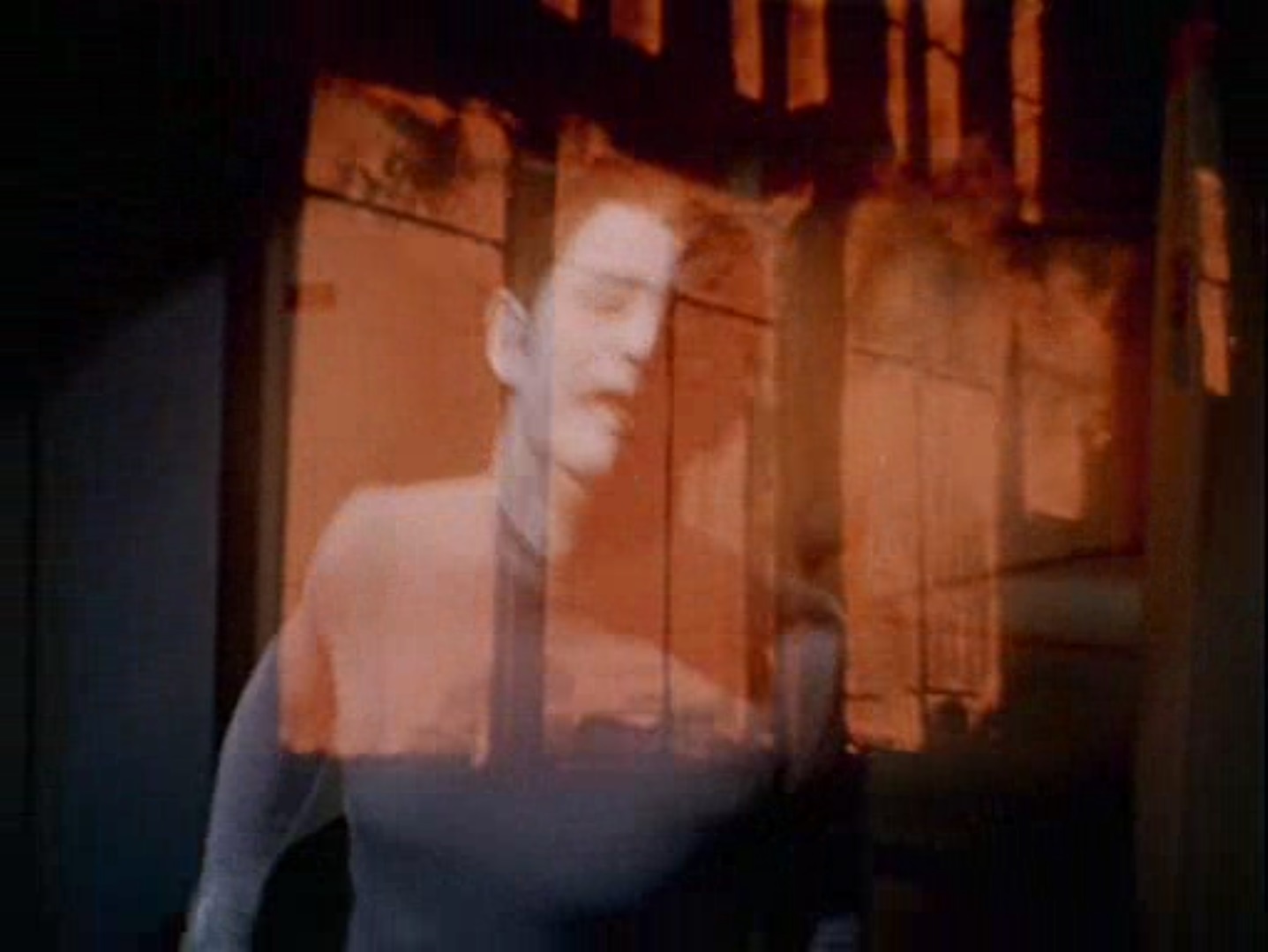
Happy memories of traipsing through the streets of Dresden
Social messages, especially simple ones, are better delivered if you don’t break the obfuscation in the telling of the story. Allow the message to speak through the story, and not scream over it. The ending displayed poor choices for what could have been a meaningful tale. It cheapened the emotional depth witnessed in the early part of the story and replaced it with shallow visual exposition just in case the audience was too simple to understand nuance. It was a poor choice.
Two stars
[Come join us tomorrow night (January 17th) for the next thrilling episode of Star Trek! KGJ is broadcasting the show live with commercials and accompanied by trekzine readings at 8pm Eastern and Pacific. You won't want to miss it…]

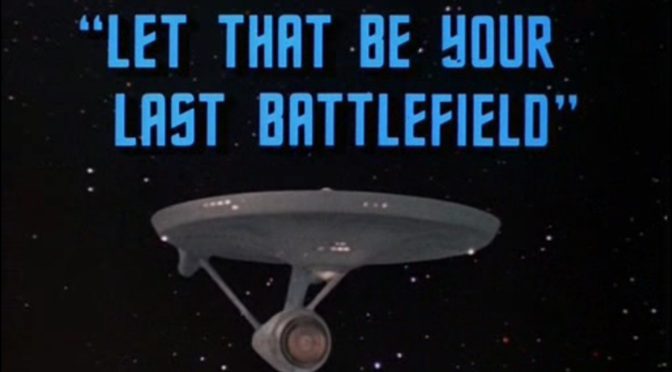
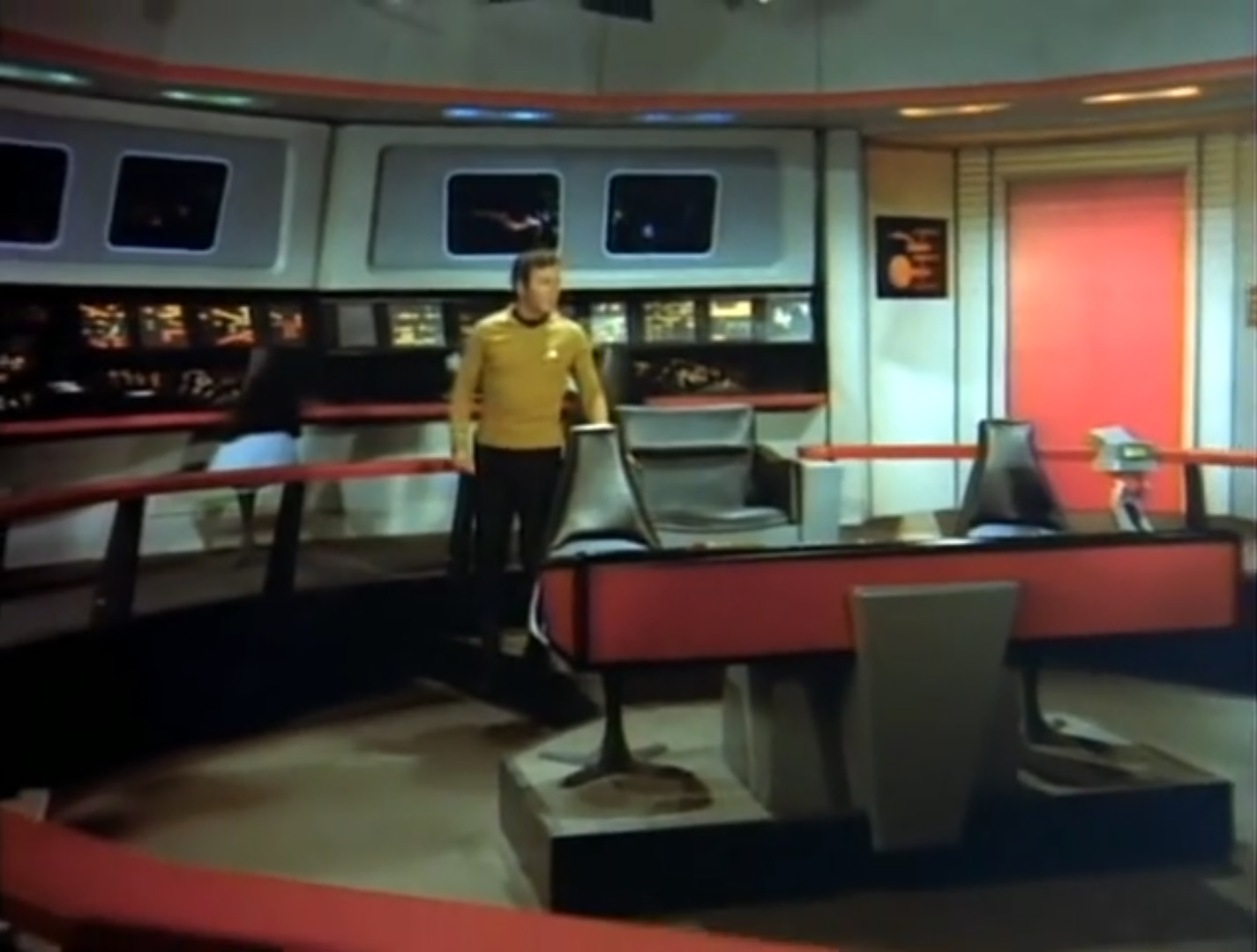


The script writer of this discursive episode was indeed a fool. I remember watching this and wondering if I should just shut it off.
I suppose there's enough here for this to be a good episode if drastically different choices had been made. Alas, far too many things happen simply because the plot needs them to happen, and the messaging is laid on with all the subtlety of those red alert shots with the rapid in-and-out zoom. (Not to mention the names: Lokai-Loki, Bele-Baal, Cheron-Charon; nothing subtle here.)
Unlike some of the reviewers, I found Bele no less unpleasant than Lokai. When pushed, he could step back and fake being diplomatic, but his first instinct is always to be overbearing and demand compliance as his right. Lokai was more sympathetic to me, but maybe that says more about me than this episode.
Shatner must have been absolutely green with envy having to share the set with someone who can chew scenery a hundred times better than he can. Maybe that encouraged him to rein it in a bit and give one of his more understated performances. There, I've managed to say something nice about this episode.
I was struck by the location of Cheron as being in the "southernmost part of the galaxy" – presumably for those folks who still hadn't gotten the message. Meanwhile having rec room doors partially open so Spock can eavesdrop is a break in series continuity (we've never seen doors on the Enterprise do that). I also note that in "By Any Other Name" Kirk rejects the idea of self-destruct out of hand when the Enterprise has been captured, but here he goes for it.
Wig Trek: no
Cave Trek: no
Fog Trek: no
Doinnggg Trek: no
Love Trek: surely you jest
Relevance Trek: For sure
Star Trek has got on board the developing fashion for relevance, meaning the story is obviously not really about adventures in our future or whatever, but about issues that make the covers of current news magazines, provide grist for Broadway (Hair), and furnish topics for pop music, like 1967’s “Get Together” by the Youngbloods (“Come on people now, smile on your brother, everybody get together, try to love one another right now”). Marvel led the way in comic books in 1966 with an Avengers narrative about a Caucasian race-hate group, secretly funded by the Communists, called the Sons of the Serpent.
But this Star Trek didn’t really do anything with the idea of racial prejudice and overheated rhetoric, other than fill up the time for an evening’s show. Bele and Lokai – their characters are obvious from the get-go. Some of the less enjoyable old Twilight Zone teleplays used to fill up the minutes till the zinger conclusion with Rod Serling unleashed at his coffee-and-cigarettes-fueled most verbose, but that hasn’t been Star Trek’s way.
The point seems to be that Bele and Lokai are identical except that their pigmentation is reversed relative to one another. But Bele seemed to have a superpower, enabling him to control the Enterprise, that Lokai didn’t have, so there was an important lack of symmetry there. Is it that the script editors just don’t care any more, or figure that the audience won’t notice? (Like with “Whom Gods Destroy,” where they evidently figured no one would ask questions about how Garth could develop his super explosive on an asylum planet — !)
When you run out of plot ideas for futuristic stories there’ll always be this relevance routine to fall back on, and perhaps the show’s producers hope it will attract new viewers. This one must have been very economical to film, occurring on the Enterprise, using an “invisible” (!) ship for Bele to chase Lokai in, etc. Well, that was economical, no need for making a new alien craft. Conveniently Lokai uses a shuttle craft… and I didn't think they were designed for travel between the stars — ?
I hope the director’s fondness for moving the camera rapidly in and out on the red alert light will not catch on. It seemed corny. The closeups of the actors’ eyes and, especially, their mouths were not to my liking at all.
Drugs, inflation, smoking, hippies, the war, women’s rights, The Youth, being Uptight, the peace movement, better housing, air and water pollution, hypocrisy, overpopulation, corrupt politicians, consumer materialism, automation – wait, — automation — we had that one already with last year’s “Ultimate Computer”….
More “relevant” teleplays may be expected, with a thin veneer of Star Trekkery laid on. I don’t look forward to that, if that’s what develops.
In the great Uncle Scrooge/Donald Duck vs. Pogo debate – Carl Barks vs. Walt Kelly – I’ve always been a fan of the Duck Man. Ever since I started reading Barks two or three years ago…. I like adventure and honest humor, not “relevance” and a lot of Talk. The Seven Cities of Cibola, not Pogo and Albert sitting on a swamp log exercising their jaws talking about politics.
Well, folks,
I agree that both Lokai and Bele are despicable characters, however, I think that they are products of the time, in that they're both skilled, manipulative, lying politicians who will say or do anything in order to get what they want.
Is Lokai's tale of oppression true?
We don't know.
Is Bele's tale of chasing rebel murderer's true?
We don't know.
So, in the episode's spirit of "A pox on both your houses" it's my guess that they're BOTH despicable liars.
Looking at the revolutions and revolutionaries of the day, there were No angels out there and Star Trek tried to say so…
…However ham handed they were at saying it.
Fantastic article! Don't forget to explore my link for the best deals and coupons.